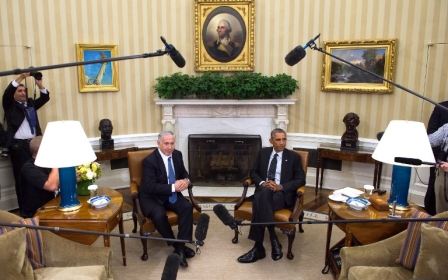Netanyahu's last trench

Early this week, Israeli television viewers had a chance to witness a rather peculiar scene. On the left side of the screen they could see and hear US President Barak Obama calling the Israeli Prime Minister Benjamin Netanyahu's insistence on ignoring his request not to address both houses of Congress a "rushed decision". On the right side of the screen the same Netanyahu reiterated his resolve the speak in front of Congress, despite Obama's opposition. Never did the rift between the two heads of state look so evident and stark.
It is fair to assume that Netanyahu did not foresee such an eventuality when he arranged his surprise trip to Washington with Republican and Speaker of the House, John Boehner, and Israeli Ambassador Ron Dermer. He certainly did not expect Obama to applaud his speech (scheduled for 3 March, two weeks before Israeli elections) whose declared goal was to foil the American administration's attempt to reach a deal with Iran on its nuclear programme. But neither did he look for such an unprecedented clash with the American president.
Yet the clash came sooner than Netanyahu expected. From 7 January, when it became known that Netanyahu was going to address Congress at Boehner's invitation, the Obama administration did its best to make clear its discontent. White House officials described the whole visit as a breach of protocol, and President Obama and Secretary of State John Kerry declared time and time again that they will not meet the Israeli prime minister so close to election time.
After some leading Democratic congressmen announced that they would not attend Netanyahu's speech, they were joined last week by Vice President Joe Biden, who typically heads meetings of both houses of Congress in his role as the Senate's President. Biden's office stated that the vice president "will be travelling abroad during the joint session of Congress". Instead of harvesting repeated standing ovations from Congress, Netanyahu risks facing dozens of empty seats.
The Obama administration, so it seems, succeeded in framing Netanyahu's visit as an act of disrespect to an American President, regardless of his political affiliation. Even Netanyahu's best friends in the US media from Fox News sharply criticised his decision to ignore Obama's pleads not to come. "They (the Israelis) think we are just a bunch of complete morons," said Shepard Smith, a commentator on Fox News.
So why does Netanyahu walk with eyes wide open into a crisis of his own creation? Why didn't he back off from the visit, as was speculated in the Israeli press early last week? The most obvious explanation is the election campaign in Israel. When Netanyahu announced his intentions to address Congress a month ago, he was trailing behind the Zionist Camp led by Yitzhak Herzog and Zipi Livni by two to three points. Now he has a narrow lead. The conclusion: the Israeli public rewarded Netanyahu for his unwillingness to bow in front of the US president while defending Israeli vital interests against Iran.
But this may be too easy a conclusion. Netanyahu's rise in the polls coincides with a sharp fall in the popularity of the Jewish Home party, meaning that he is taking votes from the extreme right, not from the centre. Centrist voters, represented mainly by Yair Lapid's Yesh Atid party, would not like to see Israel in an open confrontation with its best (and maybe only) ally, the United States. If the speech in Congress sharpens this rift, Netanyahu may lose votes in the centre at a very critical moment in the campaign, two weeks before election day.
A better explanation is that at this point in time, backing off from going to Washington may be worse, electorally speaking, than risking the deepening of the clash with the Obama administration. If Netanyahu cancels his trip now, he will be crucified by his rivals in the right-wing and mocked and ridiculed by his opponents in the centre-left. If this is correct, Netanyahu is almost forced to go ahead with his potentially risky visit.
But besides the various political considerations, both in Israel as well as among Republicans who view Netanyahu as an ally against their own president, another important consideration lies behind his insistence on speaking to the US Congress. However clumsily done, Netanyahu represents a growing fear in Israel that the Obama administration is heading not only towards a deal which allows Iran to maintain a certain nuclear programme, but also towards acknowledging Iran's rising role in the Middle East.
Yaki Dayan, Israel's former consul general to Los Angeles, says that there is growing concern in Israel from this rapprochement between the US and Iran. The Americans, claims Dayan, are looking at the map of the Middle East and see at least four countries under strong Iranian influence - Lebanon, Syria, Iraq and recently Yemen. The old American allies in the region, the Saudis, are losing ground. In the war against the Islamic State, Iran is more valuable to America than Israel.
Dayan says that there is almost a consensus in Israel that the Obama administration has decided to reach an agreement with Iran at all costs. The true meaning of such an agreement is not that Israel will be attacked by Iranian nuclear missiles any time soon, says Dayan, but that Iran will become a "threshold" nuclear power, capable of developing a nuclear weapon within a span of a year. The result will be that Iran could not be intimidated anymore. This is, of course, bad news for Saudi Arabia and for Israel, too.
The fear in Israeli political circles, according to Dayan, is that the Obama administration is not viewing such a development so negatively. The US, he says, has a weak spot regarding Iran. With its relatively big middle classes and its vibrant intellectual life, the Americans see in Iran a potential for democratic change. A nuclear deal which will free Iran from its isolation may be deemed a first step in this direction.
No one seriously talks about renewing the alliance between Iran and the US from the pre-Ayatollah Khomeini revolution. But even a hesitant US step towards Iran may be regarded in Israel as having strategic implications. With an Iran closer to the US, Israel's position in the region may weaken considerably. This may explain why Netanyahu gives such importance to preventing any deal with Iran. A clash with President Obama, uncomfortable as it may be, seems a worthy price to pay to achieve such a goal.
Dayan therefore understands and even justifies Netanyahu's decision to use the Congress' podium in order to try and stop a deal with Iran. The problem, according to him and to many Israeli diplomatic commentators, is that it is being done in the wrong way. By openly defying Obama, Netanyahu may lose some of the support of the American public, usually staunchly pro-Israeli.
The implications may linger far beyond the speech in two weeks' time. If Israel is right and Obama does opt for closer relations with Iran, there will be little Israel can do to prevent it. The brawl over Netanyahu's speech may be much more than a personal duel between the two leaders. It may be the beginning of a new phase in Israeli-American relations.
- Meron Rapoport is an Israeli journalist and writer, winner of the Napoli International Prize for Journalism for a inquiry about the stealing of olive trees from their Palestinian owners. He is ex-head of the News Department in Haaertz, and now an independent journalist.
The views expressed in this article belong to the author and do not necessarily reflect the editorial policy of Middle East Eye.
Photo: Israeli Prime Minister Benjamin Netanyahu (AA)
- Meron Rapoport is an Israeli journalist and writer, winner of the Napoli International Prize for Journalism for a inquiry about the stealing of olive trees from their Palestinian owners. He is ex-head of the News Department in Haaertz, and now an independent journalist.
Middle East Eye propose une couverture et une analyse indépendantes et incomparables du Moyen-Orient, de l’Afrique du Nord et d’autres régions du monde. Pour en savoir plus sur la reprise de ce contenu et les frais qui s’appliquent, veuillez remplir ce formulaire [en anglais]. Pour en savoir plus sur MEE, cliquez ici [en anglais].




